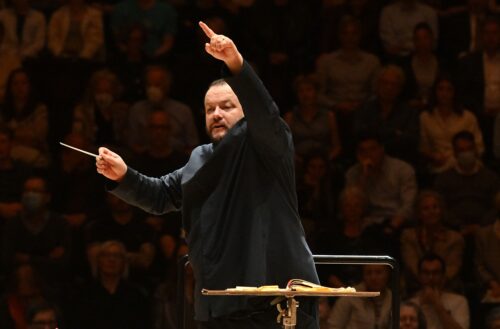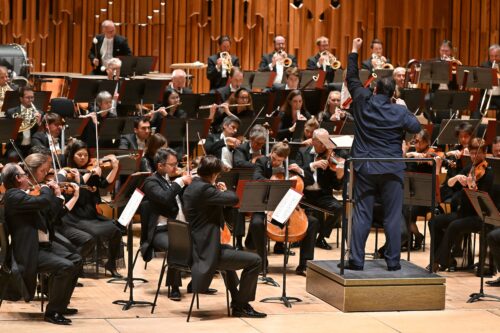 United Kingdom The Strauss Project Part I: Leipzig Gewandhaus Orchestra / Andris Nelsons (conductor). Barbican Hall, London, 9.5.2022. (KMcD)
United Kingdom The Strauss Project Part I: Leipzig Gewandhaus Orchestra / Andris Nelsons (conductor). Barbican Hall, London, 9.5.2022. (KMcD)

R. Strauss – Macbeth; Der Rosenkavalier Suite; Ein Heldenleben
Billed as The Strauss Project, and originally planned to showcase Latvian maestro, Andris Nelsons’s two orchestras which he is charge of – the Leipzig Gewandhaus Orchestra, and the Boston Symphony Orchestra (BSO), things unfortunately did not go to plan. With four concerts scheduled for the beginning of May, split between the Barbican and the Royal Festival Hall, the BSO decided late in the day not to make the trip across the pond. Citing Covid restrictions, the Bostonians decided to stay put in Massachusetts, resulting in their two concerts on the Southbank. All that remained of the project was two concerts at the Barbican with Nelsons’s Leipzig forces, of which this was the first.
Although disappointed at not getting the chance to hear Norwegian soprano Lise Davidsen in the Four Last Songs with the BSO, this concert at the Barbican turned out to be an embarrassment of musical riches. We were left grasping for superlatives – indeed we would go as far as saying that we have not heard playing of this quality for, well, a very long time. Rightly considered one of the finest orchestras in the world, they kept proving this time and time again throughout this evening devoted to three of Strauss’s most virtuosic orchestral pieces that programmed the familiar with the slightly more obscure.
Falling into the latter camp is the German composer’s tone poem based on Shakespeare’s Scottish play, Macbeth. Written in his early twenties, it was Strauss’s first foray into the world of tone poems, maintaining to this day only a shaky place in the repertoire. There are several reasons why – thematically it is rather ordinary, and some of the musical effects are overblown – but it deserves to be heard, as it is an important step on Strauss’s musical journey to fully-fledged maturity. Nelsons and his players certainly approached the work as if it were first-class Strauss – velvety strings, wonderfully-rich brass, all balanced superbly with opaque woodwind. Climaxes were never brash, instead growing from within the musical texture. Strauss’s take on Macbeth may never achieve the popularity of his later tone poems, but it is worth the occasional airing, especially when played as magnificently as it was here.
We were on more familiar ground with the following piece: Der Rosenkavalier Suite. Cobbled together from some of the most popular sections of the opera, this suite is the work of conductor Artur Rodziński, which gained Strauss’s seal of approval in 1945. Although he rearranged these chunks of music in a different chronological order to how they appear in the opera, Rodziński pulls them together successfully, even if the closing bars aren’t Strauss – but never mind. Based on these ‘highlights’ one was left desperately wanting to hear this orchestra perform the opera in its entirety, as their playing was quite simply breath-taking. The horns were on splendid form, leaving little to the imagination of what Strauss was depicting taking place behind the ‘curtain’, as were the strings once more, particularly in the waltzes, which Nelson teased out in properly balletic form from the podium. The trio, which closes the opera, was radiant and brought a lump to the throat, despite being shorn of the vocal lines. The entire orchestra breathed as one throughout, the players subtly interacting with one another purely through a glance or the occasional smile – this truly was music-making on an exalted scale.

After the interval we were treated to an incandescent performance of Ein Heldenleben (A Hero’s Life), and although it is never spelt out exactly who this hero is – there can be no mistaking it is Strauss himself. From the opening, exuberant theme on the lower strings – richly voiced – we knew that this was not going to be a run of the mill performance. Nelsons’s choice of tempi throughout was faultless, unfurling phrase after phrase in an unhurried natural manner which allowed the music to breathe. His uncanny knack of being able to build climaxes organically, without ever blurring the musical texture paid dividends, especially when the players were let off the leash in Des Helden Walstatt (The Hero’s Field of Battle) – the full force of the orchestra here was overwhelming, but never in a brash or vulgar way.
At the opposite end of the dynamic range, Nelsons cajoled his players into producing some exquisite pianissimos in Des Helden Gefährtin (The Hero’s Companion), where concertmaster Andreas Buschatz was spellbinding in his extended solos – mesmerising and deeply-moving in equal measure. The horn and violin duet which closes the work, representing the composer and his wife Pauline, were heavenly, and a fitting climax to this outstanding concert.
Keith McDonnell
